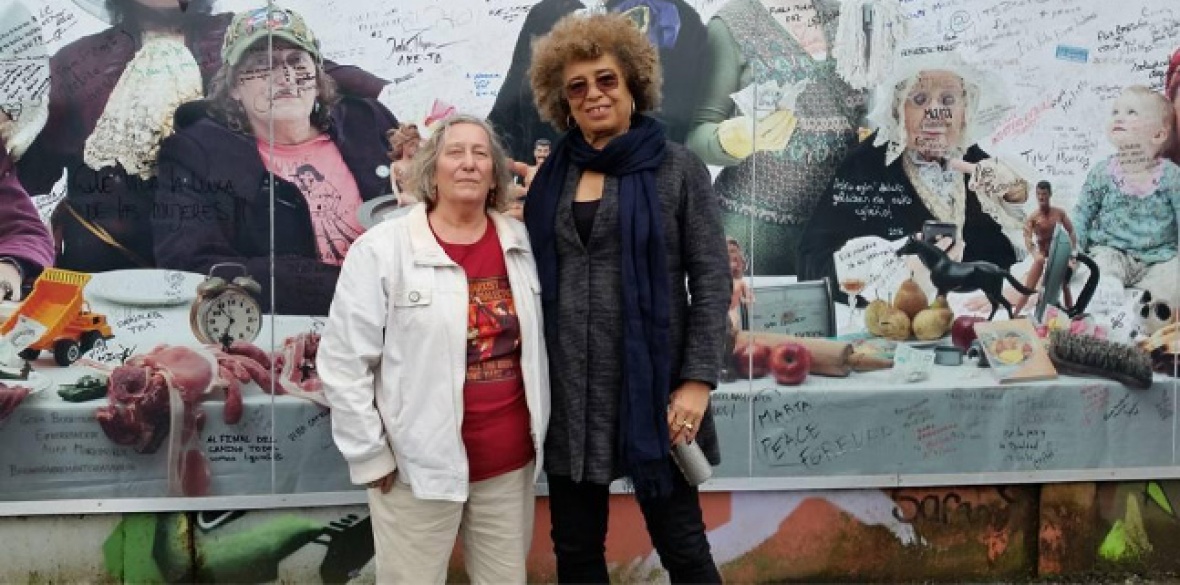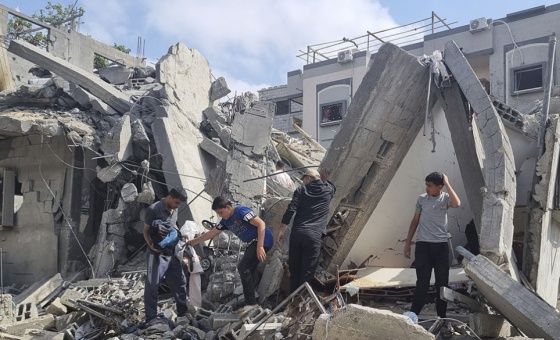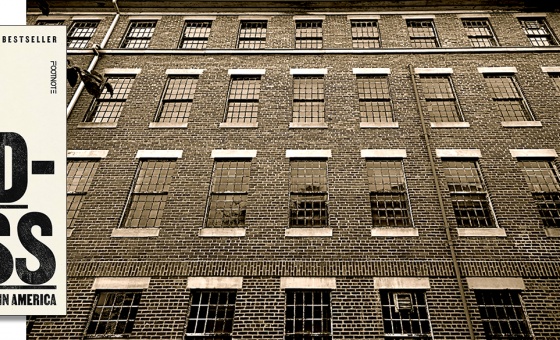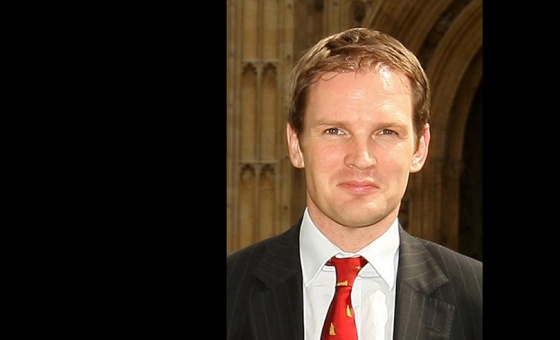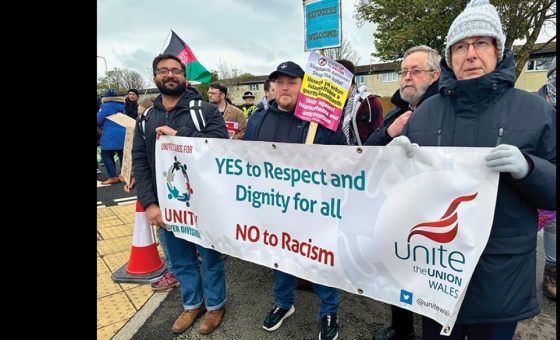This is the last article you can read this month
You can read more article this month
You can read more articles this month
Sorry your limit is up for this month
Reset on:
Please help support the Morning Star by subscribing here
WHEN Angela Davis addressed a group of over 700 people in the Whitla Hall at Belfast Queen’s University in 2017, I was immensely proud. This was her second visit to Belfast, her first being in 1994.
She told the audience how she received that invitation when she met women from Ireland in Moscow at the World Congress of Women.
In 1987 a delegation of 42 women from the length and breadth of Ireland went to Moscow — trade unionists, community activists, communists, all were thrilled to meet Angela.
The visit was organised by the Northern Ireland Women’s Rights Movement (NIWRM), a broad-based movement responsible for opening the first women’s centre in Belfast.
The NIWRM was affiliated to the Women’s International Democratic Federation.
In the early ’70s Madge Davison, general secretary of the Connolly Youth Movement (CYM) and organiser in the Northern Ireland Civil Rights Association, was one of the people helping to lead the “Free Angela Davis Campaign” here in Belfast.
Angela was framed on a murder charge by Governor Ronald Reagan. It is amazing that many people, especially younger people, do not know how Angela escaped the death sentence, because of a huge worldwide campaign.
The Communist Party of Ireland (CPI) and CYM members were part of that campaign.
When Angela was released, Madge spoke about inviting her to Ireland — Belfast, to be precise, and she would say “and I will chair the meeting when she comes!”
But it was not to be because Madge died in 1991.
Angela was invited by the NIWRM and the Ulster University (UU) to the International Women’s Day events.
Her first visit to Belfast was less hectic than her second one in 2017, because while people knew about her, there was not as big a following and political life was somewhat in lockdown.
The ceasefires began in 1994 at the end of August with the IRA announcement; this was followed by the loyalist ceasefire in October.
But when Angela arrived we were still in bloody conflict, tit-for-tat killings were taking place and some of the worst carnages occurred throughout ’93/’94, the bombing of a Shankill Road fish shop, a bar in Graysteele and the Loughinisland bar killings.
In a number of these incidents there is evidence of collusion between loyalist paramilitaries, British intelligence and the security forces which includes the Royal Ulster Constabulary, Ulster Defence Regiment and British army.
In fact, the full story of this complicity and the role of informers on both sides has yet to be laid bare.
This was the Belfast that Angela visited. The itinerary included meetings in the Ulster University and Transport House. Both were well attended.
She also visited a Bunscoil (Irish Language school) in Culturlan on the Falls Road.
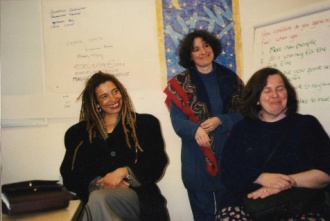
She called in at the city centre Women’s Centre, and the Falls Women’s Centre, situated in the heart of republican-nationalist West Belfast where she met a number of women, including Bernadette (Devlin) McAliskey who had visited Angela when she was in prison in the 1970s.
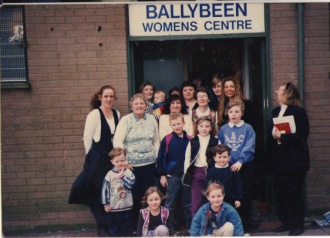
She visited Ballybeen Women’s Centre, situated in a loyalist area on the outskirts of Belfast, here she met centre users and workers including Annie, one of the women who went to Moscow in 1987.
The Falls centre at that time was just across the road from the Royal Hospital, I left her in their good hands to go and visit the hospital.
There is no easy way to say this — I had been told on March 1 1994 that my 27-year-old son Russell would die before the end of the year; he was one of the several thousand haemophiliacs who was given contaminated blood products.
I came out of the Falls Women’s Centre with a young woman who worked for An Phoblacht-Sinn Fein newspaper.
I was speaking to her about Angela; and told her that we had just been to Ballybeen, where upon she said: “Well, don’t you think that was a waste of time taking Angela there, they would not be interested in her?”
On the contrary, I thought it was quite an achievement, but answered: “Well if we are speaking to the converted all the time the Falls might be considered a waste of time.”
Angela was in fact given a great welcome at all the places we visited.
The final event was an informal dinner organised by the NIWRM in the Wellington Park Hotel.
Tommy Sands and his sister Ann sang, I particularly remember, No Time for Love if they Come in the Morning, and For your Daughters and Your Sons, a song he sang at Madge Davison’s funeral.
Angela stayed in a hotel on the Antrim Road and in the mornings walked to the nearby Grove Leisure Centre opposite Pittsburgh Street where Madge lived as a girl, in the heart of loyalist North Belfast.
One morning Angela got to the centre early and the staff opened up especially for her.
My family circumstances in 1994 meant I could not carry out all the duties allocated to me.
As a result of this, the second visit was very special for me. I sent the invite to Angela at least three years previously and she accepted for 2017.
Her visit in 2017 was at the invitation of Reclaim the Agenda, Queen’s University, and the Communist Party of Ireland.
She packed three venues, the City Hall, Queen’s University and the Wellington Park Hotel where the Communist Party held their IWD event on March 8.
Here Angela spoke about the issues facing the US people (Trump had been elected) with an emphasis on women’s lives and Black Lives Matter.
Other speakers included Patricia McKeown, regional organiser for Unison; Maura Murphy, Mandate, shopworkers’ union (Tesco striker); Kellie O’Dowd, Alliance for Choice and Kerry Fleck, CPI. We also had great entertainment from singers, storytellers and musicians.
In the audience were Bernadette McAliskey, Edwina Stewart and members of the Connolly Youth Movement and Keith Stoddart.
It is amazing to reflect back to 1994 when Sinn Fein was on the fringes of formal politics to 2017 when because of their prominent position in the city council, Councillor Deirdre Hargey (SF), later to become Lord Mayor of Belfast, acted immediately on my request for the use of the city hall for the meeting with Angela.
To be honest, it is easy to see how we now take things for granted. I would not have thought it possible to achieve what we did in 1994 and 2017.
Lynda Walker is the author of Living in an Armed Patriarchy and Madge Davison: A Revolutionary Firebrand (Shanway Press, 2011).

